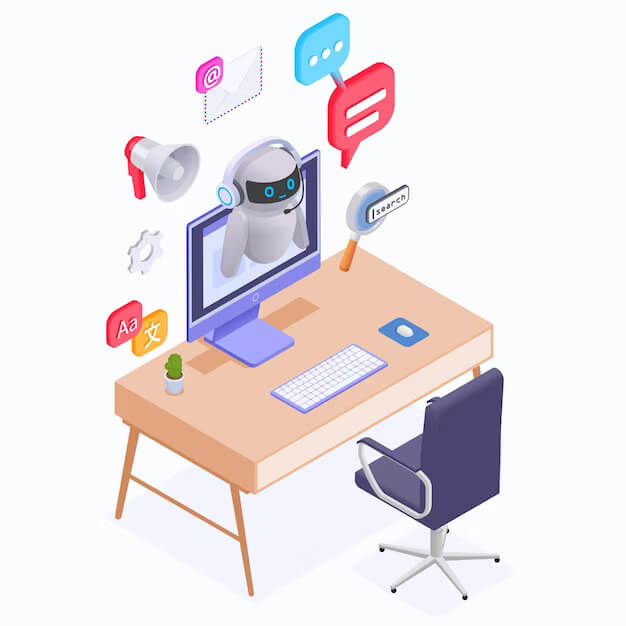AI Job Market for Non-Technical Professionals: Roles for AI Enthusiasts Without Coding Skills

So, you’re eager to dive into the world of AI, but coding isn’t your jam? No worries! The AI job market is as diverse as a box of chocolates, and there are plenty of roles for non-technical folks like you. From AI project management to data storytelling, we’ve got your ticket to ride the AI wave. Let’s explore the exciting opportunities awaiting AI enthusiasts without coding skills.
AI Project Manager: Steering the Tech Ship
Ever heard the saying, “Someone’s gotta steer the ship”? Well, in the AI world, that someone could be you! As an AI project manager, your job is to ensure that AI initiatives stay on course. You’re the captain, navigating through the turbulent waters of data, algorithms, and deadlines.
What do you do?
- Collaborate with technical teams to define project goals and scope.
- Keep a close eye on budgets and timelines.
- Translate technical jargon into plain English for stakeholders.
- Ensure the project aligns with the organization’s goals.
Why is it awesome? Picture yourself at the helm, orchestrating AI projects without writing a single line of code. You’re the liaison between the tech gurus and the decision-makers, making sure everyone’s on the same page. Plus, the salary isn’t too shabby either!
AI Data Analyst: Unearthing Insights
You may not code, but you can certainly decipher the treasure trove of data AI produces. AI data analysts are the modern-day detectives, uncovering hidden patterns and insights that can drive business decisions.
What do you do?
- Dive into data lakes to extract valuable information.
- Create visually appealing reports and dashboards.
- Collaborate with data scientists to refine AI models.
- Tell data-driven stories that guide strategic choices.
Why is it awesome? Imagine being the Sherlock Holmes of data, revealing insights that impact a company’s success. Plus, you get to flex your creativity in data visualization, turning numbers into compelling narratives.
AI Ethicist: The Moral Compass

AI may be smart, but it doesn’t always have a moral compass. That’s where AI ethicists come in. Your role is to ensure that AI systems are used responsibly and ethically.
What do you do?
- Evaluate AI algorithms for potential biases.
- Develop ethical guidelines for AI usage.
- Advise organizations on responsible AI practices.
- Advocate for fairness, transparency, and accountability.
Why is it awesome? You’re the guardian of AI’s conscience, making sure it plays nice and fair. It’s a role that combines philosophy with technology, shaping a more ethical AI landscape.
AI Sales Specialist: Pitching the Future
If you’re a people person with a knack for persuasion, consider becoming an AI sales specialist. You won’t code AI, but you’ll sell its potential to businesses eager to ride the AI wave.
What do you do?
- Understand AI solutions and their business applications.
- Build relationships with potential clients.
- Tailor AI pitches to meet client needs.
- Bridge the gap between tech and business goals.
Why is it awesome? You’re the AI evangelist, introducing companies to the transformative power of artificial intelligence. Plus, commissions and bonuses can make this role financially rewarding.
AI Content Strategist: Crafting AI Narratives

Words are your playground, and AI content strategists play a vital role in translating complex AI concepts into accessible language for the masses.
What do you do?
- Create content that explains AI in simple terms.
- Develop marketing materials for AI products.
- Craft engaging narratives around AI success stories.
- Collaborate with tech experts to bridge the communication gap.
Why is it awesome? You’re the storyteller, making AI relatable to the average Joe. Your words can inspire, educate, and drive AI adoption.
AI UX Designer: Shaping User Experiences
User experience (UX) is crucial in AI applications, and AI UX designers focus on ensuring that AI systems are user-friendly and intuitive.
What do you do?
- Design user interfaces for AI-driven apps and websites.
- Conduct user research to understand needs and pain points.
- Collaborate with developers to implement AI features.
- Iterate on designs based on user feedback.
Why is it awesome? You’re the architect of user-friendly AI experiences, making AI accessible to everyone. It’s a blend of creativity and empathy.
AI Trainer: Teaching Machines
Teaching isn’t just for humans; machines need guidance too. AI trainers help AI systems learn and improve their performance.
What do you do?
- Create training datasets for AI models.
- Annotate and label data for machine learning.
- Monitor AI’s performance and provide feedback.
- Collaborate with data scientists to refine models.
Why is it awesome? You’re at the forefront of AI’s education, helping it evolve and get better over time. It’s like being a teacher for AI!
AI Business Consultant: Strategy Whisperer
AI can be a game-changer, but businesses need a roadmap. AI business consultants provide strategic guidance on how to leverage AI effectively.
What do you do?
- Assess an organization’s needs and goals.
- Develop AI adoption strategies.
- Identify AI opportunities and risks.
- Advise on AI technology selection and implementation.
Why is it awesome? You’re the strategist, helping businesses unlock AI’s full potential. It’s about shaping the future of enterprises.
AI Recruiter: Finding the Right Talent
Even AI needs humans to build it! AI recruiters specialize in finding the right talent for AI-related roles.
What do you do?
- Understand AI skill requirements.
- Source and screen candidates with AI expertise.
- Collaborate with HR to streamline the hiring process.
- Stay updated on AI trends and job market dynamics.
Why is it awesome? You’re the matchmaker, connecting talented individuals with exciting AI opportunities. It’s all about building dream teams.
AI Technical Writer: Documentation Guru
Behind every great AI system is great documentation. AI technical writers create guides, manuals, and tutorials to make AI accessible.
What do you do?
- Write clear and concise AI documentation.
- Create user-friendly tutorials and FAQs.
- Collaborate with developers to understand AI systems.
- Ensure documentation complies with industry standards.
Why is it awesome? You’re the translator, making AI documentation user-friendly. Your work empowers others to harness the power of AI.
The AI World Awaits You!
So, there you have it! The AI job market isn’t just for coders and techies. There’s a wide array of roles where your passion for AI and non-technical skills can shine. Whether you’re steering AI projects, telling AI stories, or shaping AI user experiences, the future of AI is in your hands.
Don’t let the lack of coding skills hold you back. Embrace the AI revolution and find your niche in this exciting and ever-evolving field. The world of AI is vast, and there’s a role tailored just for you. Go ahead, dive in, and make your mark in the AI job market—no coding required!
Frequently Asked Questions (FAQ) – AI Job Market for Non-Technical Professionals
Q1: What exactly is the AI job market for non-technical professionals?
A1: The AI job market for non-technical professionals refers to a range of career opportunities in the field of artificial intelligence that don’t require deep coding or programming skills. These roles allow individuals to contribute to AI projects, strategies, and applications in various capacities without writing extensive code.
Q2: What are the advantages of pursuing AI roles without coding skills?
A2: There are several advantages, including:
- Accessibility: It opens up AI opportunities to a wider range of professionals.
- Diverse Roles: You can choose from diverse roles such as project management, ethics, sales, UX design, content strategy, and more.
- Broader Impact: You can influence AI projects’ direction, ethics, user experience, and communication.
- Competitive Salaries: Many non-technical AI roles offer competitive compensation.
Q3: What qualifications or skills do I need for non-technical AI roles?
A3: The specific qualifications and skills vary depending on the role, but generally, the following skills and qualifications can be valuable:
- Strong communication skills.
- Analytical thinking.
- Understanding of AI concepts (though not necessarily coding).
- Relevant education or experience in the chosen field (e.g., business, marketing, design, ethics).
Q4: What is the role of an AI Project Manager?
A4: An AI Project Manager oversees AI initiatives, ensuring they meet their goals, stay within budget, and adhere to timelines. They act as liaisons between technical teams and stakeholders, translating technical details into understandable language.
Q5: Can you explain the responsibilities of an AI Content Strategist?
A5: Certainly! An AI Content Strategist creates content that simplifies complex AI concepts for a broader audience. They develop marketing materials, tell AI success stories, and collaborate with technical experts to bridge communication gaps.
Q6: How can I become an AI Sales Specialist?
A6: To become an AI Sales Specialist, you should:
- Develop a strong understanding of AI solutions and their applications.
- Build a network of potential clients.
- Tailor AI pitches to client needs.
- Learn how to communicate the value of AI in business terms.
Q7: What are the key responsibilities of an AI Ethicist?
A7: AI Ethicists ensure that AI systems are used responsibly and ethically. Their responsibilities include evaluating AI algorithms for biases, developing ethical guidelines, advising organizations on responsible AI practices, and advocating for fairness and transparency.
Q8: How can I transition into the AI job market if I have a non-technical background?
A8: To transition into the AI job market without a technical background:
- Start by learning the basics of AI concepts and terminology.
- Leverage your existing skills and experiences that are relevant to non-technical AI roles.
- Consider pursuing relevant certifications or courses.
- Build a strong professional network within the AI community.
- Tailor your resume and cover letter to highlight your transferable skills.
Q9: Are there AI-related roles in HR and recruitment?
A9: Yes, there are roles like AI Recruiters who specialize in finding the right talent for AI-related positions. They source and screen candidates with AI expertise and work closely with HR to streamline the hiring process.
Q10: Where can I find job listings for non-technical AI roles?
A10: You can find job listings for non-technical AI roles on popular job search websites, company career pages, and professional networking platforms like LinkedIn. It’s also helpful to join AI-related groups and communities online, where job opportunities are often shared.